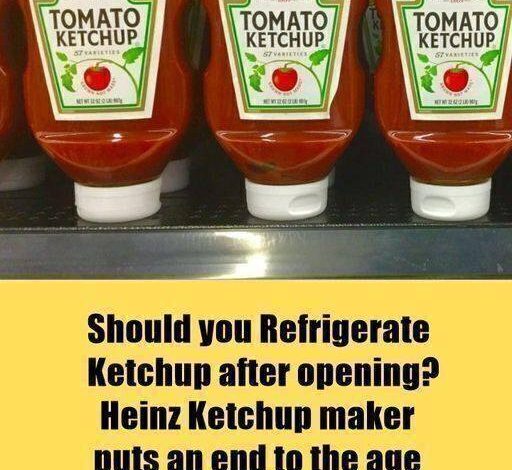Should you refrigerate Ketchup after opening? Heinz ketchup maker puts an end to the age Old Question

Ketchup. That tangy, tomato-based condiment that graces countless burgers, fries, and hot dogs. But when it comes to storing this beloved sauce, there’s a seemingly endless debate: does it belong on the shelf or in the refrigerator?
Many of us have likely pondered this question while navigating the grocery store aisles. The logic seems simple: if a product isn’t refrigerated in the store, it probably doesn’t need to be at home, right? However, the reality is often more nuanced.
A closer look at the ketchup bottle label often reveals a crucial instruction: “Refrigerate after opening.” While this instruction might seem insignificant, it’s a vital piece of information that can significantly impact the flavor and longevity of your ketchup.
Heinz, the iconic ketchup brand, has taken a definitive stance on this issue: refrigerate after opening. This recommendation might seem surprising considering the ubiquitous presence of unrefrigerated ketchup bottles on supermarket shelves. However, Heinz emphasizes that refrigeration helps to preserve the optimal flavor and quality of their product.
Uncovering the Truth: A Label Investigation
Intrigued by this ketchup controversy, I decided to investigate further. Examining a bottle of Heinz ketchup in my own pantry, I discovered the subtle instruction: “For best results, refrigerate after opening.” This clear directive from the manufacturer suggests that refrigeration is indeed the preferred method of storage.
The Ketchup Twitter War: A Social Media Showdown
However, the debate surrounding ketchup storage extends beyond mere label instructions. A now-famous tweet from Heinz, simply stating “FYI: Ketchup goes in the fridge!!!” ignited a heated discussion among ketchup enthusiasts on social media. To further fuel the fire, Heinz conducted a poll, revealing a surprising split in opinion: 36.8% favored cupboard storage, while 63.2% opted for refrigeration.
The Case for Cupboard Storage: Convenience and Tradition
So, why do some individuals choose to defy the recommendation to refrigerate ketchup? Many argue that room temperature storage is perfectly acceptable and that ketchup boasts a remarkably long shelf life. While this may be true, refrigeration offers a distinct advantage: it significantly extends the shelf life of the product, ensuring that your ketchup remains fresh and flavorful for an extended period.
Choosing the Best Storage Method: A Personal Decision
Ultimately, the decision of whether or not to refrigerate ketchup is a personal one. If you’re still undecided, consider the advice of Heinz, the leading ketchup manufacturer, and the majority of ketchup lovers who prefer refrigeration. By opting to chill your ketchup, you can ensure that you enjoy its optimal flavor and quality for as long as possible.
Join the Conversation: Where Do You Store Your Ketchup?
Now it’s your turn to weigh in! Do you keep your ketchup on the shelf or in the refrigerator? Share your storage preferences and join the ongoing debate surrounding this age-old ketchup conundrum.




